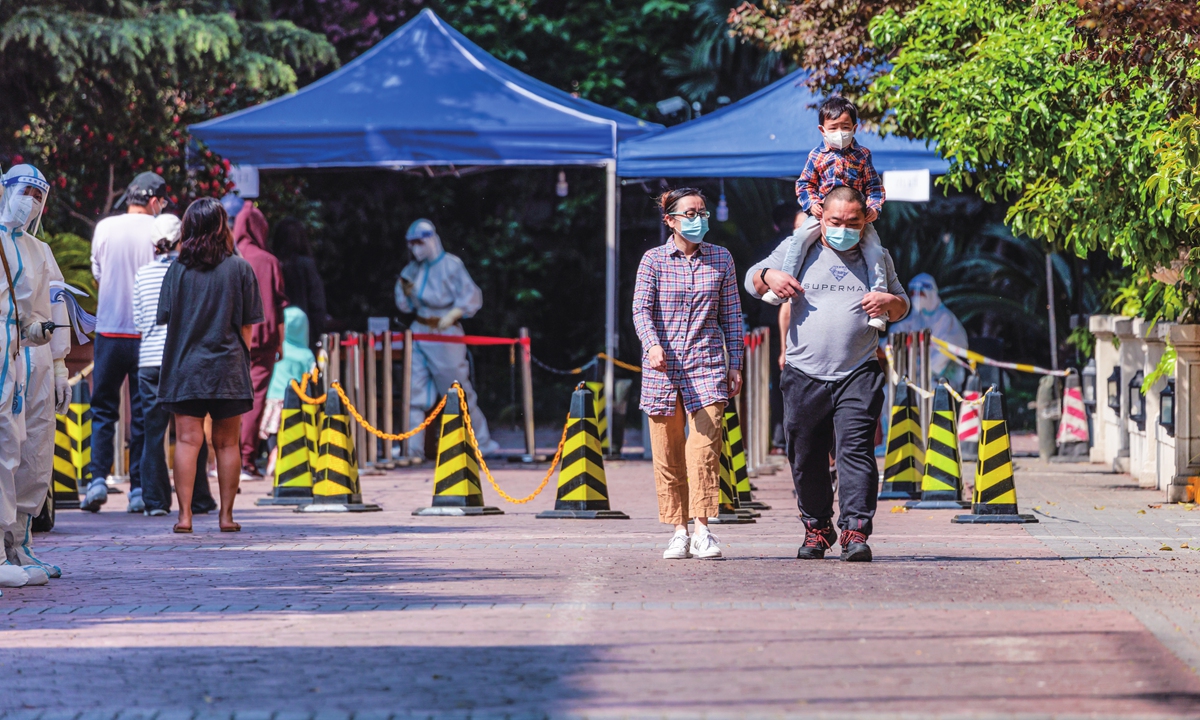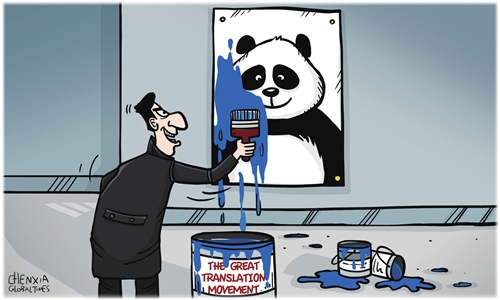Twisted in translation: Western media, social groups set up language barriers by intentionally misreading, misinterpreting Chinese materials
In recent years, China's social and economic policies are a hot topic of discussion among media all over the world. Unfortunately, few Western media outlets can correctly show their audience an authentic image of China due to their lack of understanding of the country or their malicious bias against it.
Observers found that erroneous translations have become a crucial barrier in today's transcultural communication between China and the West.
There are many incorrect China-related translations existing in current transcultural communication in various fields including mass media outlets, social media platforms and transnational enterprises. These linguistic faux-pas have caused or deepened foreign audiences' misunderstanding and prejudice against China, said Chinese scholars reached by the Global Times.
For example, the "dynamic zero-COVID" policy, which was adopted by epidemic-hit areas like Shanghai and Jilin to bring outbreaks under control in the shortest possible time, was peculiarly translated as "Social Zero Covid" in a BBC article on April 9, even though Chinese health experts have repeatedly said it was not aimed at no infection, but was for the fast detection and elimination of infection.
Some anti-China individuals and organizations, such as the infamous "great translation movement" during the Russia-Ukraine conflict, are also busy translating and sharing online the extreme comments of a few Chinese netizens.
"The strategy of the 'movement' has now also become that of anti-China forces, and its emergence shows the extensive and systematic trend of stigmatizing China via Chinese translations," Tang Jingtai, professor at the School of Journalism of Fudan University, recently published a commentary calling for domestic and international attention to the chaos of China-related "translations" that were aimed at smearing the image of China and Chinese people.

Mistranslation campaign
Looking back at some of the incorrect China-related translations by Western media, influencers and renowned enterprises in the past couple of years, and the controversies they had sparked among the Chinese public, many were likely to be deliberate "mistakes" that tried to distort the image of China, observers noted.
This has become a "serious, urgent problem" which prevents the international audience from getting a true and objective understanding of China, Dong Guanpeng, professor and dean of the National Institute of Strategic Communication at the Communication University of China, told the Global Times.
Portraying the images of Chinese entrepreneurs as extreme and absurd through mistranslating their words was a common tactic of US media during the China-US trade frictions in 2020. In June 2020, the article titled "Huawei Founder Ren Zhengfei Takes Off the Gloves in Fight Against US," The Wall Street Journal (WSJ) quoted Ren's words "sha chu yi tiao xue lu" - a Chinese idiom for fighting one's way out of a difficult situation.
The article, however, ridiculously translated it into "surge forward, killing as you go, to blaze us a trail of blood," which laughably described Ren as an irrational Chinese tech giant who vowed "revenge" on the US and the West. The mistranslation was soon quoted by some British and Australian media in stories with sensational titles such as "China's Huawei threatens West with 'trail of blood'" and "Huawei's founder declares 'war' on West."
Worse still, some of the world's most popular translation service providers were caught cheating users in terms of China-related translations, which has severely misled global users and smeared China. In November 2021, Google Translate enraged Chinese public for translating "AIDS" as "Communist Party of China Central Committee," or "AIDS patients" as "Wuhan residents." Google replied to the Global Times in an email that it was "working on a fix," but didn't make any explanation about this malevolent fault.
Behind these superficial mistranslation incidents, however, lurk the long-term hostility and prejudice of the West toward China, remarked Chinese scholars. Enjoying a dominant voice in the international public opinion field, the US-led West has been launching an anti-China "cognitive warfare," and mistranslation is one of its tricks targeting the billions of non-Chinese speaking audience.
"In the past, some translation mistakes might have been caused by technical defects or the incompetency of translators; but now, particularly during the last two years, we found that some foreign politicians, media and think tanks deliberately worsen the mistranslation problem," Dong told the Global Times. "There must be some organizations or individuals that intentionally tarnish the images of China and Chinese people by setting up the language barrier and deepening the misunderstanding," he said.
Incompetence, malice of translators
Some non-professional "translators," "reporters" and organizations have also been springing up online discrediting China through translation. Under the banner of making China known to foreign readers, they consciously choose to translate materials based on their own ideological positions and political interests in order to take them out of context and demonize China.
On the back of the current Russia-Ukraine conflict, the "great translation movement," which has gained some momentum on social media platforms such as Twitter and Instagram, has come into public view. By unilaterally handpicking and translating some radical remarks on Chinese social media, it elevates them to "deep-rooted bad habits" of the whole Chinese nation.
The rumors that the "great translation movement" chose to translate have further festered on the websites of hostile platforms such as US-based SupChina, one of many China-bashing organizations that actively create, spread and hype anti-China content to wage an overseas "cognitive warfare."
Professor Tang from Fudan University noted that anti-Chinese forces are now mature enough to use the internet to self-organize - actively plan anti-Chinese issues to infiltrate and mobilize some netizens, driving them to act like woodpeckers to find a few rare, extreme statements and then embellish them.
Yang Xuedong, a professor of political science at Tsinghua University, told the Global Times that "In the global discourse arena, the West holds media hegemony and monopolizes the supply of media content. Western media coverage of non-Western societies focuses more on negative news, thus providing their audiences with a picture that is often inverted from the reality." Yang also noted that when rumors go viral, the internet can rapidly spread and reinforce the biased perceptions of the audience.

The errors and chaos in China-related translations are partly due to the incompetence of translators and the malice of certain organizations and individuals, Yang said. But ultimately, "they are caused by China's long-standing marginalization, weakness and even vilification in the Western-dominated world discourse system," he told the Global Times.
Tang noted that in Western academic circles, there are many scholars who involuntarily carry out Western-centric translations with deep-rooted biases.
For example, in the translation of The Analects of Confucius: A Philosophical Translation, despite that renowned US Confucian scholars Roger T. Ames and Henry Rosemon tried to break the Western centrism and bridge the gap between Chinese and Western philosophies in the process of compilation, the book describes Confucius as an "exemplary person" who uses "authoritative conduct" to denote the benevolence of Confucius, making the book "both alien to the English reader and bizarre to the Chinese reader.
At the same time, Tang said that the international community generally lacks systematic knowledge of China's political and economic context and traditional Chinese culture, thus it faces more difficulties in understanding some of China's original concepts.
According to a report in the South China Morning Post titled "War of Words: How the United States Got Lost in Chinese Translation," former Chinese PLA colonel Qiao Liang criticized the English translation of his and Wang Xiangsui's military strategy book Unrestricted Warfare for being full of loopholes from the start.
Qiao considered the title of his book should have been translated as "War Beyond Limits" because the book was only intended to emphasize how a weaker country should deal with a strong power. He also complained that a subtitle added later, War and Strategy in the Globalisation Era, was reworded into China's Master Plan to Destroy America in an English edition of the book.
"Such a translation is not only incomprehensible, but also fails to make the outside world feel the goodwill of China," Tang noted.
"The impression of those who read the book in English is that [China has] moved from being terrorism researchers to terrorists," Qiao said.
After the Cold War, the Western discourse portrayed the East, especially the Communist countries as an evil force, and this perception has been deeply embedded in the mainstream Western culture, Tsinghua professor Yang said.
Objectively, accurately, evocatively
Thankfully, there are some Western scholars who are committed to translating and interpreting Chinese materials objectively, accurately, and evocatively.
In November 2021, the full Dutch translation of Dream of the Red Chamber was published. Three Dutch translators, Anne-Sytske-Keijser, Silvia-Marijnissen, and Mark-Leenhouts, have worked for 13 years to complete the four volumes of the 2,160-page translation. Such an elaborate translation was so well received in the Netherlands that the first printing has been sold out and publishers are organizing additional prints.
As China's comprehensive strength continues to grow, there are several new Chinese-style English words and expressions coming into use. For example, Chinese astronauts have their own exclusive English word "taikonaut," which was also used in a tweet from the European Space Agency congratulating the China National Space Administration on the successful launch of the Shenzhou-12 manned spacecraft.
Some Western media outlets use the term "Chinawood" to refer to the developing Chinese film industry.
"The main goal of translation should have been exchanges between China and the West and learning from each other on an equal footing to bring about positive influence," Professor Tang said.
To remove barriers and seize the initiative in China-related transcultural communication, experts suggest China work more on offering authoritative multi-language translations of the country's policies timely and accurately.
"Our first principles on issues related to the regions like Xinjiang, Hong Kong and the island of Taiwan, as well as our main economic, political, social and technological polices that may get the attention of global opinion, our official documents, reports and press releases should be published in both Chinese and English," Dong said.
Dong suggests English-speaking government officials, politicians and entrepreneurs to communicate with foreign peers and media directly in English. "That' won't give those with an ulterior motive a chance to play tricks in translating their words."
Experts also encourage China's young generation with better language skills and broader vision to communicate more effectively on both online and offline international platforms, telling the world true, undistorted stories about China and the Chinese people. "Their voices deserve to be heard in the Western-dominated opinion field," they told the Global Times.
Observers found that erroneous translations have become a crucial barrier in today's transcultural communication between China and the West.
There are many incorrect China-related translations existing in current transcultural communication in various fields including mass media outlets, social media platforms and transnational enterprises. These linguistic faux-pas have caused or deepened foreign audiences' misunderstanding and prejudice against China, said Chinese scholars reached by the Global Times.
For example, the "dynamic zero-COVID" policy, which was adopted by epidemic-hit areas like Shanghai and Jilin to bring outbreaks under control in the shortest possible time, was peculiarly translated as "Social Zero Covid" in a BBC article on April 9, even though Chinese health experts have repeatedly said it was not aimed at no infection, but was for the fast detection and elimination of infection.
Some anti-China individuals and organizations, such as the infamous "great translation movement" during the Russia-Ukraine conflict, are also busy translating and sharing online the extreme comments of a few Chinese netizens.
"The strategy of the 'movement' has now also become that of anti-China forces, and its emergence shows the extensive and systematic trend of stigmatizing China via Chinese translations," Tang Jingtai, professor at the School of Journalism of Fudan University, recently published a commentary calling for domestic and international attention to the chaos of China-related "translations" that were aimed at smearing the image of China and Chinese people.

Photo: IC
Mistranslation campaign
Looking back at some of the incorrect China-related translations by Western media, influencers and renowned enterprises in the past couple of years, and the controversies they had sparked among the Chinese public, many were likely to be deliberate "mistakes" that tried to distort the image of China, observers noted.
This has become a "serious, urgent problem" which prevents the international audience from getting a true and objective understanding of China, Dong Guanpeng, professor and dean of the National Institute of Strategic Communication at the Communication University of China, told the Global Times.
Portraying the images of Chinese entrepreneurs as extreme and absurd through mistranslating their words was a common tactic of US media during the China-US trade frictions in 2020. In June 2020, the article titled "Huawei Founder Ren Zhengfei Takes Off the Gloves in Fight Against US," The Wall Street Journal (WSJ) quoted Ren's words "sha chu yi tiao xue lu" - a Chinese idiom for fighting one's way out of a difficult situation.
The article, however, ridiculously translated it into "surge forward, killing as you go, to blaze us a trail of blood," which laughably described Ren as an irrational Chinese tech giant who vowed "revenge" on the US and the West. The mistranslation was soon quoted by some British and Australian media in stories with sensational titles such as "China's Huawei threatens West with 'trail of blood'" and "Huawei's founder declares 'war' on West."
Worse still, some of the world's most popular translation service providers were caught cheating users in terms of China-related translations, which has severely misled global users and smeared China. In November 2021, Google Translate enraged Chinese public for translating "AIDS" as "Communist Party of China Central Committee," or "AIDS patients" as "Wuhan residents." Google replied to the Global Times in an email that it was "working on a fix," but didn't make any explanation about this malevolent fault.
Behind these superficial mistranslation incidents, however, lurk the long-term hostility and prejudice of the West toward China, remarked Chinese scholars. Enjoying a dominant voice in the international public opinion field, the US-led West has been launching an anti-China "cognitive warfare," and mistranslation is one of its tricks targeting the billions of non-Chinese speaking audience.
"In the past, some translation mistakes might have been caused by technical defects or the incompetency of translators; but now, particularly during the last two years, we found that some foreign politicians, media and think tanks deliberately worsen the mistranslation problem," Dong told the Global Times. "There must be some organizations or individuals that intentionally tarnish the images of China and Chinese people by setting up the language barrier and deepening the misunderstanding," he said.
Incompetence, malice of translators
Some non-professional "translators," "reporters" and organizations have also been springing up online discrediting China through translation. Under the banner of making China known to foreign readers, they consciously choose to translate materials based on their own ideological positions and political interests in order to take them out of context and demonize China.
On the back of the current Russia-Ukraine conflict, the "great translation movement," which has gained some momentum on social media platforms such as Twitter and Instagram, has come into public view. By unilaterally handpicking and translating some radical remarks on Chinese social media, it elevates them to "deep-rooted bad habits" of the whole Chinese nation.
The rumors that the "great translation movement" chose to translate have further festered on the websites of hostile platforms such as US-based SupChina, one of many China-bashing organizations that actively create, spread and hype anti-China content to wage an overseas "cognitive warfare."
Professor Tang from Fudan University noted that anti-Chinese forces are now mature enough to use the internet to self-organize - actively plan anti-Chinese issues to infiltrate and mobilize some netizens, driving them to act like woodpeckers to find a few rare, extreme statements and then embellish them.
Yang Xuedong, a professor of political science at Tsinghua University, told the Global Times that "In the global discourse arena, the West holds media hegemony and monopolizes the supply of media content. Western media coverage of non-Western societies focuses more on negative news, thus providing their audiences with a picture that is often inverted from the reality." Yang also noted that when rumors go viral, the internet can rapidly spread and reinforce the biased perceptions of the audience.

People line up for Covid-19 testing in a residential community in Shanghai, April 12, 2022. Photo: IC
The errors and chaos in China-related translations are partly due to the incompetence of translators and the malice of certain organizations and individuals, Yang said. But ultimately, "they are caused by China's long-standing marginalization, weakness and even vilification in the Western-dominated world discourse system," he told the Global Times.
Tang noted that in Western academic circles, there are many scholars who involuntarily carry out Western-centric translations with deep-rooted biases.
For example, in the translation of The Analects of Confucius: A Philosophical Translation, despite that renowned US Confucian scholars Roger T. Ames and Henry Rosemon tried to break the Western centrism and bridge the gap between Chinese and Western philosophies in the process of compilation, the book describes Confucius as an "exemplary person" who uses "authoritative conduct" to denote the benevolence of Confucius, making the book "both alien to the English reader and bizarre to the Chinese reader.
At the same time, Tang said that the international community generally lacks systematic knowledge of China's political and economic context and traditional Chinese culture, thus it faces more difficulties in understanding some of China's original concepts.
According to a report in the South China Morning Post titled "War of Words: How the United States Got Lost in Chinese Translation," former Chinese PLA colonel Qiao Liang criticized the English translation of his and Wang Xiangsui's military strategy book Unrestricted Warfare for being full of loopholes from the start.
Qiao considered the title of his book should have been translated as "War Beyond Limits" because the book was only intended to emphasize how a weaker country should deal with a strong power. He also complained that a subtitle added later, War and Strategy in the Globalisation Era, was reworded into China's Master Plan to Destroy America in an English edition of the book.
"Such a translation is not only incomprehensible, but also fails to make the outside world feel the goodwill of China," Tang noted.
"The impression of those who read the book in English is that [China has] moved from being terrorism researchers to terrorists," Qiao said.
After the Cold War, the Western discourse portrayed the East, especially the Communist countries as an evil force, and this perception has been deeply embedded in the mainstream Western culture, Tsinghua professor Yang said.
Objectively, accurately, evocatively
Thankfully, there are some Western scholars who are committed to translating and interpreting Chinese materials objectively, accurately, and evocatively.
In November 2021, the full Dutch translation of Dream of the Red Chamber was published. Three Dutch translators, Anne-Sytske-Keijser, Silvia-Marijnissen, and Mark-Leenhouts, have worked for 13 years to complete the four volumes of the 2,160-page translation. Such an elaborate translation was so well received in the Netherlands that the first printing has been sold out and publishers are organizing additional prints.
As China's comprehensive strength continues to grow, there are several new Chinese-style English words and expressions coming into use. For example, Chinese astronauts have their own exclusive English word "taikonaut," which was also used in a tweet from the European Space Agency congratulating the China National Space Administration on the successful launch of the Shenzhou-12 manned spacecraft.
Some Western media outlets use the term "Chinawood" to refer to the developing Chinese film industry.
"The main goal of translation should have been exchanges between China and the West and learning from each other on an equal footing to bring about positive influence," Professor Tang said.
To remove barriers and seize the initiative in China-related transcultural communication, experts suggest China work more on offering authoritative multi-language translations of the country's policies timely and accurately.
"Our first principles on issues related to the regions like Xinjiang, Hong Kong and the island of Taiwan, as well as our main economic, political, social and technological polices that may get the attention of global opinion, our official documents, reports and press releases should be published in both Chinese and English," Dong said.
Dong suggests English-speaking government officials, politicians and entrepreneurs to communicate with foreign peers and media directly in English. "That' won't give those with an ulterior motive a chance to play tricks in translating their words."
Experts also encourage China's young generation with better language skills and broader vision to communicate more effectively on both online and offline international platforms, telling the world true, undistorted stories about China and the Chinese people. "Their voices deserve to be heard in the Western-dominated opinion field," they told the Global Times.



